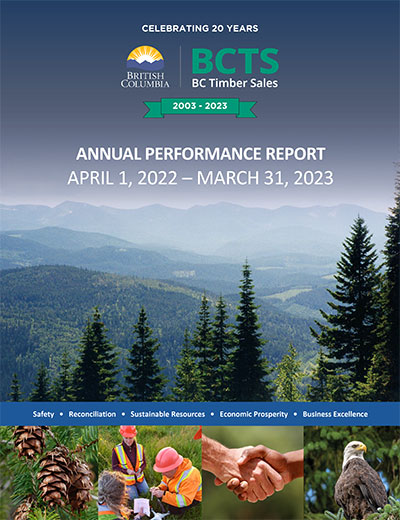BC Timber Sales - Defining success at BCTS
 British Columbia's forests are important to communities across the province and the provincial economy.
British Columbia's forests are important to communities across the province and the provincial economy.
One this page
- BCTS Annual Performance Report
- Creating a value-added economy
- Supporting rural and urban communities
At BCTS, we are committed to ensuring the success of B.C.’s forestry sector and the families that depend upon it for generations to come. Our activities directly support 8,000 jobs and thousands of additional indirect jobs in the 33 communities in which we operate.
The end of the beetle-kill harvest, unprecedented wildfires and changing forest management practices and values have impacted the provincial timber supply. To address these challenges, BCTS is supporting the forest sector with tools to manufacture products that are higher-value, made-in-B.C. and created from less. The BCTS Value-added Manufacturing Program was created in collaboration with the B.C. wood manufacturing sector.
We continue working to ensure the forestry sector has access to new programs aimed at increasing fibre utilization.
BCTS Annual Performance Report

Since its creation in 2003 as a self-financing program, BCTS has earned over $2.0 billion dollars in net revenue and generated over $562 million of indirect revenue for the province. In addition, BCTS operations generate approximately $800 million in annual GDP for the province.
Each year BCTS publishes the Annual Performance Report, a document highlighting not only our fiscal contribution to the province but also our progress toward social, cultural and environmental goals, each of which is a measure of our success.
Read the 2023 Annual Performance Report
Read quarterly and historical reports
Creating a value-added economy
Unlocking more value
Value-added wood products are creating more jobs in the province and increasing value from our timber harvest. As an example, engineered wood products for the construction industry can create up to 9 jobs per oven-dried ton of forest biomass.

Explore our value-added initiatives
Supporting rural and urban communities
BCTS activities across the province support the resiliency and prosperity of rural and urban communities through direct and indirect employment and by creating ongoing and predictable revenue for the government.
Since 2003, BCTS has earned almost $2.6 billion dollars in net revenue and indirect revenue. This revenue is used to support important initiatives such as constructing highways, schools, and funding healthcare services in the province.
On average, over the next three years, BCTS activities will directly support over 4,600 well-paying jobs and another 6,100 indirect jobs in B.C.

